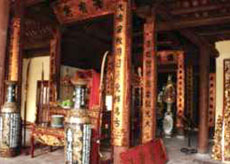Le Chan was a widowed aristocrat, who helped the Hai Ba Trung defeat the occupying Chinese forces in 39AD. No small wonder she is still honoured today.
 Located in An Bien Ward, Le Chan District, Hai Phong City, Nghe Temple is dedicated to Lady Le Chan – a widowed aristocrat who transformed herself into general and fought valiantly alongside the Hai Ba Trung (Trung Trac and Trung Nhi) in the first century AD.
Located in An Bien Ward, Le Chan District, Hai Phong City, Nghe Temple is dedicated to Lady Le Chan – a widowed aristocrat who transformed herself into general and fought valiantly alongside the Hai Ba Trung (Trung Trac and Trung Nhi) in the first century AD.
The Chinese – specifically the Eastern Han Dynasty (25-220AD) – had annexed Vietnam (known as Nam Viet at the time) in 111BC and for over a hundred years had sent officials to govern the “southern provinceâ€. The Vietnamese were allowed to keep their own system of feudal chiefs at lower levels but the Chinese overlords still ruled the roost – often in draconian fashion – and tension inevitably simmered overtime.
After the execution of Thi Sach, who was married to Trung Trac, the two sisters led an angry but well-organized uprising against the Chinese, ably assisted by the likes of Le Chan, who is believed to have been the Hai Ba Trung’s most crafty general and strategist.
Crucially before the battle began Le Chan had helped recruit troops. She had also built a garrison where provisions could be stored and troops could train. She named the garrison An Bien after her homeland, located in Quang Ninh province today. Le Chan was appointed chief of the garrison and Commander of Hai Tan Town (Hai Phong today). She was also given the honorary title of Thanh Chan Princess for founding Hai Tan Town’s Defensive Force.
After this period of secretive preparation, the Hai Ba Trung rebellion undoubtedly took the Chinese overlords by surprise. In 39AD Trung Trac and Trung Nhi first repelled a small Chinese force from their village and after assembling a large army – according to legend consisting mostly of women – they went on to seize 65 citadels back from the Chinese and just like that Nam Viet had been liberated.
It’s easy to see why the Hai Ba Trung sisters are revered to this day in Vietnam. As Louise Williams writes in her book Wives, Mistresses and Matriarchs, “The powerful vision of three women leading their men atop of the gilded seats on elephants, tumbles forward through the generations, a national source of pride and strength.†Tellingly, afterwards the Hai Ba Trung sisters were declared kings, not queens (perhaps, reflective of the times, as only a ‘king’ could rule men).
The Hai Ba Trung’s reign of power would be short lived however. In 43AD the Chinese Han King ordered his General Ma Vien to amass a huge army and invade Nam Viet. The Trung Sisters and Le Chan rallied the troops once more. Another female general Phung Thi Chinh went into battle despite being heavily pregnant. Legend has it that she gave birth on the front line and with her baby in one arm and a sword in the other, she continued to fight. But this time the Han had returned in numbers and the Viet troops were soon completely overrun.
To preserve her dignity, Le Chan took her own life, as did the Trung sisters and all the other female generals, including Phung Thi Chinh. Afterwards An Bien people set up a temple as a shrine in honour of Le Chan, where today stands Den Nghe (Nghe Temple).
The temple is not just a sacred place but also of great artistic value and well worth visiting. The main shrine has a space in the form of the Chinese character Tam (Three) with an anteroom, a middle room and a back room. The walls and ceiling are covered with sculpted relief depicting scenes from Vietnamese mythology. Engravings on wood depict scenes representing the four seasons.
The most valuable relic remaining there is the stone memorial stele with characters reading ‘The story of An Bien Hai Phong’ that dates back to the reign of King Khai Dinh (1916- 1925). The inscription on the stele tells the story of Le Chan and lists the various titles conferred on her by the kings of different dynasties.
The tomb, recognized as a national vestige in 1975, is still regularly visited by Vietnamese people who still credit Le Chan with establishing An Bien - Hai Phong Township and admire her bravery in the face of adversity.
The Nghe Temple Festival is annually organized from the 8th to the 10th day of the second lunar month for worshiping Le Chan.